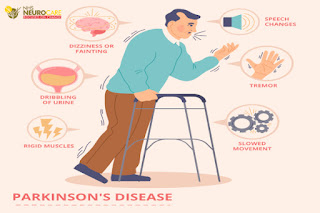Parkinson's Disease: Symptoms, Causes & Treatment
A neurodegenerative disorder affecting movement, Parkinson's disease is the most common form of the disease. It happens when certain nerve cells in the brain die. This causes problems with muscle control and movement. Parkinson's disease can be very mild in the beginning but worsens over time. There is no cure for Parkinson's disease. But with the right treatment that can help manage the symptoms. In this blog post, we will explore the symptoms, causes, and treatment options for Parkinson's disease.
What is Parkinson's Disease?
Although there is no known cure for Parkinson's disease, medications may significantly lessen symptoms. The neurologists at NHS Neuro Care can offer the finest treatment available to aid with illness management.
Symptoms of Parkinson's Disease
There are a number of different symptoms that are associated with the disease, and these can vary somewhat from person to person. In general, however, the most common symptoms of Parkinson's disease include:
- Tremor: This is often the first symptom that people notice, and it usually affects one hand or foot. The tremor may be mild at first, but it typically becomes worse over time.
- Rigidity: This refers to stiffness in the muscles, and can make it difficult to move around.
- Bradykinesia: This is a slowdown in movement, and can make simple tasks like getting dressed or brushing your teeth much more difficult.
- Postural instability: This can make it hard to balance, and increases the risk of falls.
Over a period of time the symptoms that may appear are:
● Depression
● Drooling
● Difficulty in Eating
● Sleeping Difficulty
● Bladder Problems
● Blood Pressure
● Smell malfunction
● Exhaustion
● Discomfort in particular body parts
Causes of Parkinson's Disease
There are many different possible causes of Parkinson's disease, but the mostly cause is unknown. Parkinson's disease may be caused by a combination of genetic and environmental factors.
Some studies suggest that people with certain genetic mutations are more likely to develop Parkinson's disease. However, it is unclear whether these mutations directly cause the disease or if they simply increase a person’s risk.
Environmental factors that have been linked to Parkinson's disease include exposure to certain toxins and viruses. For example, people who have been exposed to the metal manganese are at increased risk for developing Parkinson's disease.
Although the exact cause of Parkinson's disease is unknown, there are some risk factors that have been identified. These include age, family history, and certain environmental exposures.
Conclusion
The treatment plan at NHS Neuro Care in Jalandhar is designed to control symptoms, provide patients the ability to operate without the aid of various drugs and delay the emergence of new symptoms. Since the disease has no recognized cause, hence there are no known preventative measures. To decide on a course of therapy that will aid the patient in the right management of the condition, the Parkinson's disease specialist in Jalandhar will work closely with the patient.


Comments
Post a Comment